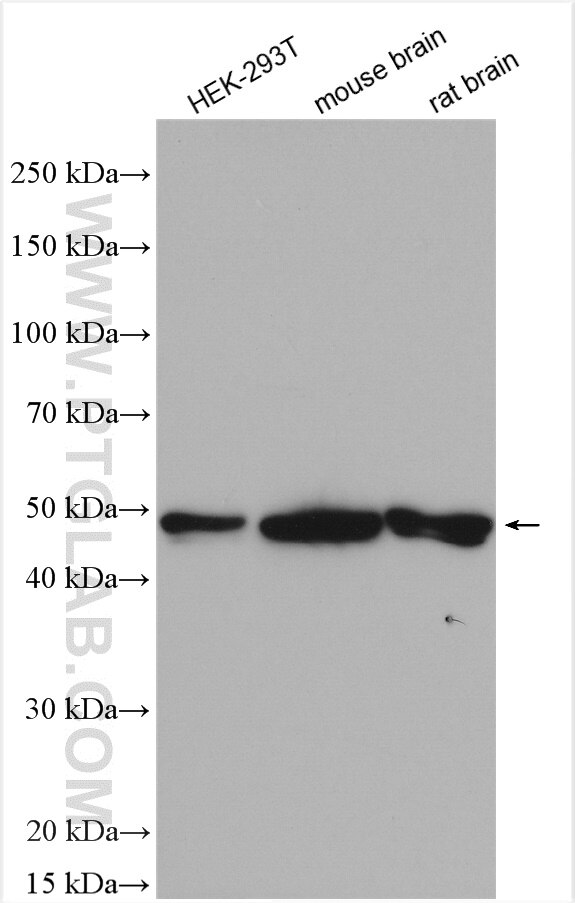Tested Applications
| Positive WB detected in | HEK-293T cells, mouse brain tissue, rat brain tissue |
Recommended dilution
| Application | Dilution |
|---|---|
| Western Blot (WB) | WB : 1:500-1:2000 |
| It is recommended that this reagent should be titrated in each testing system to obtain optimal results. | |
| Sample-dependent, Check data in validation data gallery. | |
Product Information
10667-1-AP targets SCLY in WB, ELISA applications and shows reactivity with human, mouse, rat samples.
| Tested Reactivity | human, mouse, rat |
| Host / Isotype | Rabbit / IgG |
| Class | Polyclonal |
| Type | Antibody |
| Immunogen |
CatNo: Ag0972 Product name: Recombinant human SCLY protein Source: e coli.-derived, PGEX-4T Tag: GST Domain: 145-445 aa of BC007891 Sequence: HDSIRLPLEHLVEEQVAAVTFVPVSKVSGQTEVDDILAAVRPTTRLVTIMLANNETGIVMPVPEISQRIKALNQERVAAGLPPILVHTDAAQALGKQRVDVEDLGVDFLTIVGHKFYGPRIGALYIRGLGEFTPLYPMLFGGGQERNFRPGTENTPMIAGLGKAAELVTQNCEAYEAHMRDVRDYLEERLEAEFGQKRIHLNSQFPGTQRLPNTCNFSIRGPRLQGHVVLAQCRVLMASVGAACHSDHGDQPSPVLLSYGVPFDVARNALRLSVGRSTTRAEVDLVVQDLKQAVAQLEDQA Predict reactive species |
| Full Name | selenocysteine lyase |
| Calculated Molecular Weight | 49 kDa |
| Observed Molecular Weight | 48 kDa |
| GenBank Accession Number | BC007891 |
| Gene Symbol | SCLY |
| Gene ID (NCBI) | 51540 |
| RRID | AB_2183693 |
| Conjugate | Unconjugated |
| Form | Liquid |
| Purification Method | Antigen affinity purification |
| UNIPROT ID | Q96I15 |
| Storage Buffer | PBS with 0.02% sodium azide and 50% glycerol, pH 7.3. |
| Storage Conditions | Store at -20°C. Stable for one year after shipment. Aliquoting is unnecessary for -20oC storage. 20ul sizes contain 0.1% BSA. |
Background Information
Selenocysteine lyase(SCLY or SCL) catalyzes the decomposition of L-selenocysteine to L-alanine and elemental selenium. This protein expresses in all mouse tissues examined, with the highest expression in liver, kidney, and testis. Mouse Scly localized to the cytosolic fraction in mouse liver and formed homodimers(PMID:10692412).This antibody detects the N-terminal of the protein.
Protocols
| Product Specific Protocols | |
|---|---|
| WB protocol for SCLY antibody 10667-1-AP | Download protocol |
| Standard Protocols | |
|---|---|
| Click here to view our Standard Protocols |




